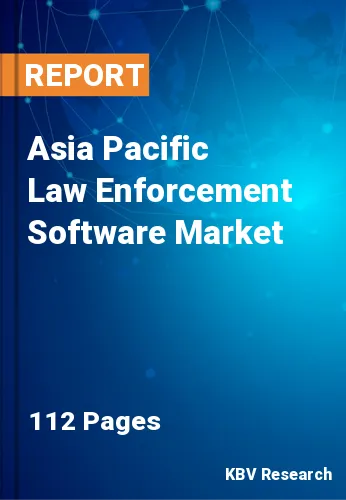Chapter 1. Market Scope & Methodology
1.1 Market Definition
1.2 Objectives
1.3 Market Scope
1.4 Segmentation
1.4.1 Asia Pacific Law Enforcement Software Market, by Component
1.4.2 Asia Pacific Law Enforcement Software Market, by Deployment Mode
1.4.3 Asia Pacific Law Enforcement Software Market, by Country
1.5 Methodology for the research
Chapter 2. Market Overview
2.1 Introduction
2.1.1 Overview
2.1.1.1 Market Composition and Scenario
2.2 Key Factors Impacting the Market
2.2.1 Market Drivers
2.2.2 Market Restraints
Chapter 3. Competition Analysis - Global
3.1 KBV Cardinal Matrix
3.2 Recent Industry Wide Strategic Developments
3.2.1 Partnerships, Collaborations and Agreements
3.2.2 Product Launches and Product Expansions
3.2.3 Acquisition and Mergers
3.2.4 Geographical Expansions
3.3 Top Winning Strategies
3.3.1 Key Leading Strategies: Percentage Distribution (2018-2022)
Chapter 4. Asia Pacific Law Enforcement Software Market by Component
4.1 Asia Pacific Solution Market by Country
4.2 Asia Pacific Law Enforcement Software Market by Solution Type
4.2.1 Asia Pacific Computer-aided dispatch Market by Country
4.2.2 Asia Pacific Incident Response & Case Management Market by Country
4.2.3 Asia Pacific Record Management Market by Country
4.2.4 Asia Pacific Jail Management Market by Country
4.2.5 Asia Pacific Others Market by Country
4.3 Asia Pacific Services Market by Country
4.4 Asia Pacific Law Enforcement Software Market by Services Type
4.4.1 Asia Pacific Implementation Market by Country
4.4.2 Asia Pacific Consulting Market by Country
4.4.3 Asia Pacific Training & Support Market by Country
Chapter 5. Asia Pacific Law Enforcement Software Market by Deployment Mode
5.1 Asia Pacific On-premise Market by Country
5.2 Asia Pacific Cloud Market by Country
Chapter 6. Asia Pacific Law Enforcement Software Market by Country
6.1 China Law Enforcement Software Market
6.1.1 China Law Enforcement Software Market by Component
6.1.1.1 China Law Enforcement Software Market by Solution Type
6.1.1.2 China Law Enforcement Software Market by Services Type
6.1.2 China Law Enforcement Software Market by Deployment Mode
6.2 Japan Law Enforcement Software Market
6.2.1 Japan Law Enforcement Software Market by Component
6.2.1.1 Japan Law Enforcement Software Market by Solution Type
6.2.1.2 Japan Law Enforcement Software Market by Services Type
6.2.2 Japan Law Enforcement Software Market by Deployment Mode
6.3 India Law Enforcement Software Market
6.3.1 India Law Enforcement Software Market by Component
6.3.1.1 India Law Enforcement Software Market by Solution Type
6.3.1.2 India Law Enforcement Software Market by Services Type
6.3.2 India Law Enforcement Software Market by Deployment Mode
6.4 South Korea Law Enforcement Software Market
6.4.1 South Korea Law Enforcement Software Market by Component
6.4.1.1 South Korea Law Enforcement Software Market by Solution Type
6.4.1.2 South Korea Law Enforcement Software Market by Services Type
6.4.2 South Korea Law Enforcement Software Market by Deployment Mode
6.5 Australia Law Enforcement Software Market
6.5.1 Australia Law Enforcement Software Market by Component
6.5.1.1 Australia Law Enforcement Software Market by Solution Type
6.5.1.2 Australia Law Enforcement Software Market by Services Type
6.5.2 Australia Law Enforcement Software Market by Deployment Mode
6.6 Malaysia Law Enforcement Software Market
6.6.1 Malaysia Law Enforcement Software Market by Component
6.6.1.1 Malaysia Law Enforcement Software Market by Solution Type
6.6.1.2 Malaysia Law Enforcement Software Market by Services Type
6.6.2 Malaysia Law Enforcement Software Market by Deployment Mode
6.7 Rest of Asia Pacific Law Enforcement Software Market
6.7.1 Rest of Asia Pacific Law Enforcement Software Market by Component
6.7.1.1 Rest of Asia Pacific Law Enforcement Software Market by Solution Type
6.7.1.2 Rest of Asia Pacific Law Enforcement Software Market by Services Type
6.7.2 Rest of Asia Pacific Law Enforcement Software Market by Deployment Mode
Chapter 7. Company Profiles
7.1 IBM Corporation
7.1.1 Company Overview
7.1.2 Financial Analysis
7.1.3 Regional & Segmental Analysis
7.1.4 Research & Development Expenses
7.1.5 SWOT Analysis
7.2 Accenture PLC
7.2.1 Company Overview
7.2.2 Financial Analysis
7.2.3 Segmental and Regional Analysis
7.2.4 Research & Development Expenses
7.2.5 Recent strategies and developments:
7.2.5.1 Acquisition and Mergers:
7.2.6 SWOT Analysis
7.3 Motorola Solutions, Inc.
7.3.1 Company Overview
7.3.2 Financial Analysis
7.3.3 Regional & Segmental Analysis
7.3.4 Research & Development Expenses
7.3.5 Recent strategies and developments:
7.3.5.1 Product Launches and Product Expansions:
7.3.5.2 Acquisition and Mergers:
7.4 NICE Ltd.
7.4.1 Company Overview
7.4.2 Financial Analysis
7.4.3 Segmental and Regional Analysis
7.4.4 Research & Development Expenses
7.4.5 Recent strategies and developments:
7.4.5.1 Partnerships, Collaborations, and Agreements:
7.4.5.2 Product Launches and Product Expansions:
7.5 DXC Technology Company
7.5.1 Company Overview
7.5.2 Financial Analysis
7.5.3 Segmental and Regional Analysis
7.6 Esri, Inc.
7.6.1 Company Overview
7.7 Hexagon AB
7.7.1 Company Overview
7.7.2 Financial Analysis
7.7.3 Regional & Segmental Analysis
7.7.4 Research & Development Expenses
7.7.5 Recent strategies and developments:
7.7.5.1 Partnerships, Collaborations, and Agreements:
7.7.5.2 Product Launches and Product Expansions:
7.7.5.3 Geographical Expansions:
7.8 Nuance Communications, Inc. (Microsoft Corporation)
7.8.1 Company Overview
7.8.2 Financial Analysis
7.8.3 Segmental and Regional Analysis
7.8.4 Research & Development Expenses
7.8.5 Recent strategies and developments:
7.8.5.1 Partnerships, Collaborations, and Agreements:
7.9 Axon Enterprise, Inc.
7.9.1 Company Overview
7.9.2 Financial Analysis
7.9.3 Segmental and Regional Analysis
7.9.4 Research & Development Expenses
7.9.5 Recent strategies and developments:
7.9.5.1 Partnerships, Collaborations, and Agreements:
7.10. Palantir Technologies Inc.
7.10.1 Company Overview
7.10.2 Financial Analysis
7.10.3 Segmental and Regional Analysis
7.10.4 Research & Development Expenses

